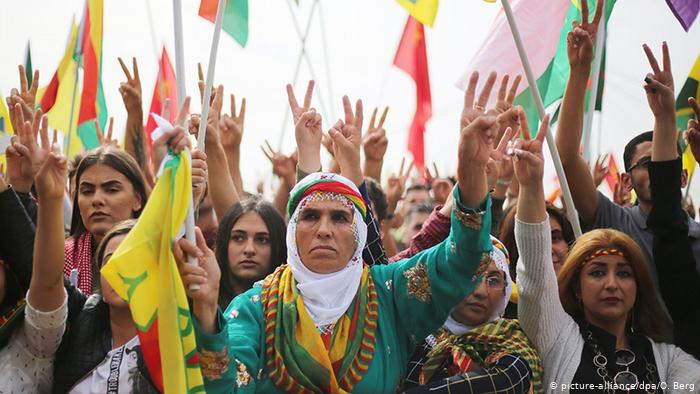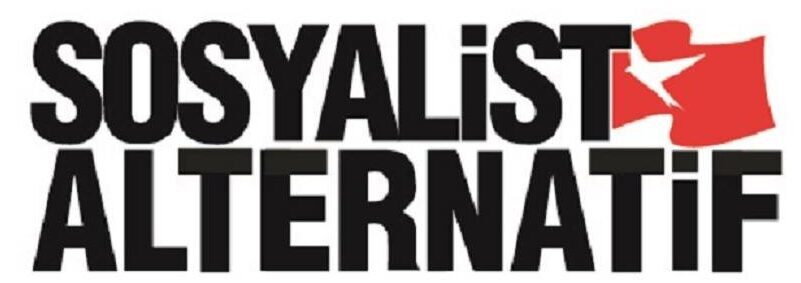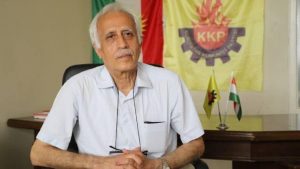
By Arne JOHANSSON, CWI Sweden
This is a slightly edited version, first printed in “Offensiv” – weekly paper of the CWI in Sweden
The sudden withdrawal of the United States from north-eastern Syria has, in one fell swoop, placed the Syrian Kurdish forces in the YPG (People’s Protection Units) and their close allies in the war against ISIS within the SDF (Syrian Democratic Forces) in a face to face confrontation with Erdoğan’s troops and aerial bombings and the overwhelming Turkish invasion of north-eastern Syria.
This has not only led to a growing humanitarian disaster involving hundreds of dead and, according to Kurdish data, 275,000 civilians fleeing the fighting towards unknown destinations. It could also be the beginning of the end for regional self-government in Rojava, since their leaders, facing the threat of a Turkish massacre, have sought protection from the Syrian army.
Trump’s sudden decision in his “unmatched wisdom” to pull away US forces from the area apparently came as a complete surprise to the YPG and SDF. It seems they trusted, right to the end, US promises made during the war against ISIS. Turkey’s invasion has also been facilitated by the fact that over the past year, the US has managed to persuade its Kurdish “allies” to compromise on Turkish “security demands” by abandoning some of its previous fortifications along the border with Turkey.
Faced with Trump’s “knife in the back” and the alarm from the Turkish bombing, a dramatic agreement, opportunistically negotiated by Russia, was reached with the Syrian Assad regime. According to Kurdish leaders, it is “only” about military issues – so far, it should be added.
In a statement, the SDF says that it is the Syrian government’s duty “to protect the country’s borders and preserve Syrian sovereignty — for the Syrian Army to enter and deploy along the Syrian-Turkish border to help the SDF stop this aggression and liberating the areas that the Turkish army and mercenaries had entered.”
That such a choice between “a rock and a hard place” could emerge is something that the Kurdish organisations cannot have been unaware of. “We do not trust their promises and we know that we would have to make painful compromises with Moscow and Bashar al-Assad if we go down the road of working with them. But if we have to choose between compromises and the genocide of our people, we will surely choose life for our people,” says SDF commander-in-chief, Mazloum Abdi, about the military/political U-turn in the US magazine, Foreign Policy. However, considering the regime’s brutal legacy of oppression of the Kurds, concluding a deal with Assad could well prove just as fatal in the future.
The Syrian army has very quickly reached key positions in northern and eastern Syria such as Tel Tamer, Ain Issa (where a Turkish raid on Monday resulted in a mass escape of ISIS family members) and now also the strategically central city of Manbij, right under the nose of Turkey’s allies, the Syrian jihadist militias of the so-called Syrian National Army. How the Turkish advance is affected by this Russian Syrian move will show whether Erdoğan can in any way be persuaded to compromise or not.
At home, Erdoğan’s war has succeeded in whipping up a patriotic intoxication, which has led to celebrations of the Turkish soldiers at the border, military salutes from Turkish footballers and parliamentary support from all major parties except the left-wing and Kurd-supported, HDP. Since the Turkish Supreme Court has threatened all critics of the war with charges of supporting terrorists, a prosecutions are is already being prepared against a number of mainly HDP mayors and members but also against a leading CHP politician in Istanbul who dared to say that the war is “unjust” and “against the Kurds.”
Erdoğan has so far disdainfully rejected all protests from both US and European politicians who now, like Sweden’s new Foreign Minister, Ann Linde, are washing their hands and like Trump himself, stepping up their appeals for “restraint” with demands for a ceasefire and negotiations, a stop to weapons deliveries and threats of sanctions. But when Erdoğan now appears to be faced with the choice of holding back or triggering an even more devastating war with a Russian-backed Syria, the stakes are higher.
As this article is being written on the seventh day of the Turkish invasion, Turkish forces and their allies continue to advance in rural areas with predominantly Arab populations, especially along the 45 km wide border area between Tal Abyad and the well-fortified Ras al-Ain, which Turkey, despite harsh fighting, has not yet succeeded in taking.
At the same time, it seems that the situation is relatively calm in both Manbij and in Kurdish core areas such as Kobane not far from there and Qamishli further east, where the Syrian military is also located.
The openly stated goal of the Turkish Erdoğan regime is to clear out the Kurdish YPG, who he calls PKK-affiliated terrorists (the PKK has for decades waged an intermittent armed struggle in Turkey), from a 32-kilometer wide security zone along the entire Euphrates border area to the Iraqi border.
He also wants to send upwards of two million of the 3.6 million Syrian refugees in Turkey to this area. But his main goal behind all this is, just as the CWI in Turkey says, to break the Kurds’ democratic rights and all hopes for a self-governing region in both Syria and Turkey.
All indications are that the Russian Putin regime, like Trump, has been very well informed in advance of Turkey’s plans. In a belated attempt to deny that the Turkish offensive had been approved in advance by Moscow, Putin’s Syrian envoy, Alexander Lavrentiev, called it “unacceptable”, at the same time as he confirmed that Russia had mediated the Assad-SDF agreement on the Syrian army’s advance with the Kurdish forces.
Putin’s “red line” when it comes to the Turkish invasion seems to be that Erdoğan sticks to his promise not to establish a permanent occupation, while trying to get Turkish approval for the Russian peace plan that gives the Assad regime full control over the entire territory of Syria, while also disarming the Kurdish forces.
Relations between Rojava’s leaders and the blood-soaked Assad regime in Damascus have always balanced on a knife edge but they have not been completely frozen. During the eight-year long Syrian war that followed the legitimate mass protests of the “Arab Spring”, the Kurdish forces have managed to stay out of the sectarian massacres that quickly developed into a minor world war in a single country.
They (like the PKK in Turkey) have limited their political demands to a regional confederation within Syria and have refrained from demanding the formation of their own state. They have also chosen to never attack the Syrian army (and vice versa), while a few Syrian military posts have remained in Rojava (of which the largest is in the largest Kurdish city of Qamishli), trade relations have been maintained and some coordination has taken place in the war against ISIS.
The development of the Syrian war has also put an end to Erdoğan’s hopes of defeating the Assad regime and appointing a Turkish vassal in Damascus, while at the same time, Erdoğan and Assad have a common interest in, as clearly as possible, quashing the Kurds’ struggle for regional self-government, backed up by their own security forces. For Erdoğan, it is also about trying to strengthen his weakened position at home – the war against the Kurds is also a war against the domestic opposition.
It is possible that the Turkish invasion will be limited to the occupation of that part of the border area where Erdoğan wants to send many of the Arab refugees, currently in Turkey. This will change the demographic composition of that zone. This could happen if the Syrian army at the same time manages to establish control of other border areas.
The fact that Russian sources are said to expect Turkey to slow down its invasion and Erdoğan has dismissed fears of a military conflict with Syria in Kobane (which he, according to US Vice President Pence, has promised Trump that he will not take control of, stating that “in Kobane with Russia’s positive actions, there seems to be no problem ”) may indicate such a development.
At the same time, it is hard to imagine that Assad would have dared to move his forces to such strategic border areas as these if he had not been given hints by the Russians that they would not be attacked by the Turkish air force.
A key question will then be whether the Kurdish organisations allow the YPG and SDF to be dissolved or to join the Syrian army, possibly in exchange for offers of a disarmed and watered down regional or local self-government.
This is something that has been suggested in previous negotiations by both Russia, UN representatives and the United States, and which has not been explicitly dismissed by the Assad regime (though rejected all the more categorically by Turkey and their allied Syrian opposition groups). But any anti-democratic agreement imposed on the Kurds must be rejected.
In the struggle for national, democratic and social rights, in the defence of Rojava, the Kurds can only rely on their own strength and the solidarity of workers and the oppressed in the region and worldwide.
At the same time, both Assad’s and Erdoğan’s authoritarian regimes rest on shaky ground. In Syria’s case, the country is in ruins. In Turkey, there is an oppressed opposition in a country experiencing a growing economic, social and political crisis.
In the short term, the nationalist hysteria that the war has whipped up, as well as the very severely limited democratic rights in Turkey, makes it difficult for a strong anti-war movement to emerge at home, while the Kurdish diaspora around the world is at the forefront of international protests.
But this will change as the phases of the invasion, such as the cold-blooded execution and ISIS-like desecration of the female Kurdish politician, Hevrin Khalaf, and Erdoğan’s real aims become more known and solidarity with the Kurds’ struggle grows.
We demand:
- Stop Erdoğans war – solidarity with the resistance of Rojava´s Kurds and with Syria´s oppressed peoples and refugees
- Boycott the Turkish regime – international trade union boycotts against all trade with the Turkish war machine, solidarity with all Kurdish and Turkish trade unions and left-wing organisations that oppose the war
- No collaboration with imperialist powers
- End all Swedish military cooperation with NATO and all arms exports to Turkey, not a penny to Erdoğan’s war
- Full support to the Kurdish struggle for the right to national self-determination, as well as for democratic and social rights for all peoples and womens´ liberation
- Down with Erdoğan and all the repressive regimes of the region – fight for a voluntary, democratic and socialist confederation of all the oppressed peoples of the Levant and the entire Middle East.


